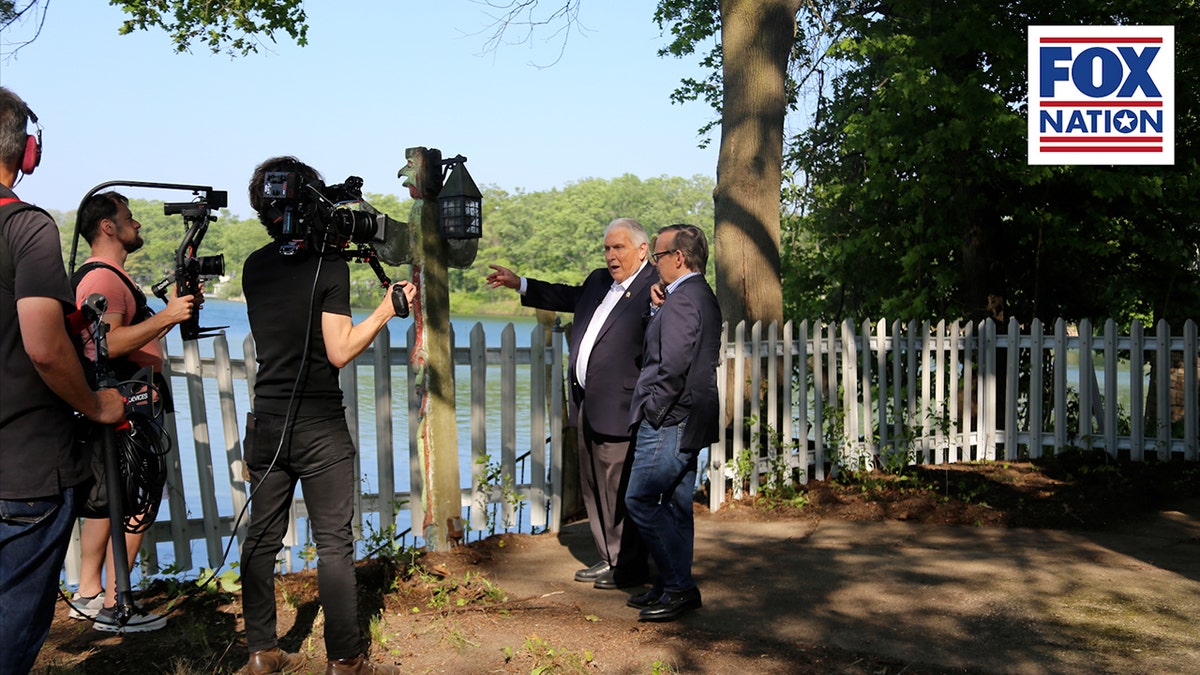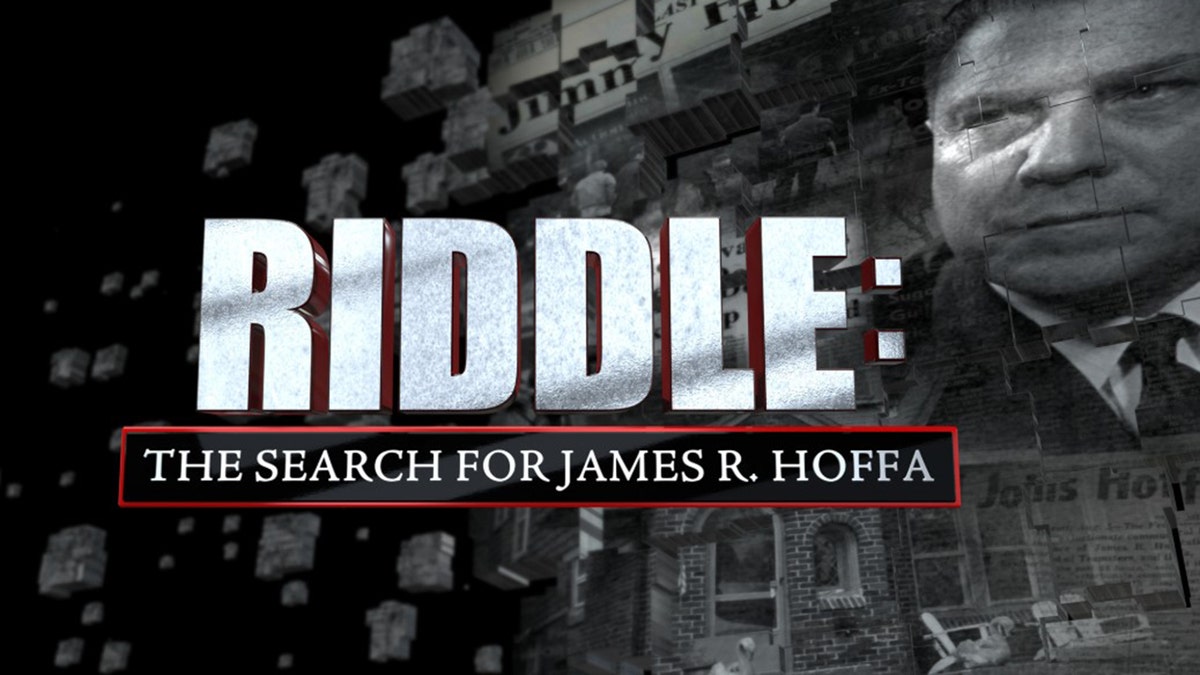NEWYou can now listen to Fox News articles!
Jimmy Hoffa’s disappearance ignores his life.
The legendary labor leader, who was the hard-charging former president of the International Brotherhood of Teamsters, had a quiet, hidden place where he could kick back and relax with his family away from the intense public spotlight.
Hoffa’s sanctuary was an unassuming wooden house and compound on the shore of Lake Orion, 38 miles north of Detroit. It was Hoffa’s beloved getaway where he spent decades with his wife Josephine, daughter Barbara and son James, granddaughter Barbara and grandsons David and Geoffrey, and assorted family and friends. But it is also the place he left on the afternoon of July 30th, 1975, to head to a meeting that resulted in his tragic disappearance.
JIMMY HOFFA’S SON: WHO KILLED MY DAD, WHY, AND WHAT IT DID TO MY FAMILY

The James R. Hoffa home, a modest-looking two-story frame building on the shore of Lake Orion, about forty miles north of Detroit. (Bettmann Archive/Getty Images)
“He loved this place,” said Hoffa’s son James. “When he came home, he was just Dad.”
This summer, Fox Nation visited the house with Mr. Hoffa and his son David, as part of our series “Riddle, The Search for James R. Hoffa.” The last two episodes of the series highlight the role the lake house played in the family.
The Hoffas sold the house in 1986, but, strangely, it remains much as it was during the summer of 1975 today, so many years later.

Jimmy Hoffa’s big wood console TV set still sits in the living room. (Fox Nation)
Jimmy Hoffa’s furniture is still in it. His wood-paneled console TV still sits in the living room where he watched it. The only books on the shelf were from 1975, the year he vanished. His copy of the 1975 “Who’s Who in America,” which of course lists him, rests alongside his copies of “The Celebrity Register” and “Men of Achievement.”
The old green shag wall-to-wall carpet was still underfoot in the living room.
Jimmy Hoffa’s carved wooden Totem Pole still stands overlooking the lake.
Even his white and orange garden tractor, a 3415 H Simplicity, that he used to mow his own lawn remains in the backyard.

Jimmy Hoffa used this garden tractor to mow his own lawn. It is still there. (Fox Nation)
“As busy as he was, he was a good father, and he always found time for his family, and he was a good family man,” said James. He said his father did his own home repairs, built parts of the house and grounds himself, cleared trees and brush and did his own yardwork.
“He was a working man all the way,” he said.
This summer promises a new life for the Hoffa house. It was bought by Susan and John Hagen, who plan to renovate it and are appreciative and respectful of its unique history.
“We knew the house was Jimmy Hoffa’s summer estate when we saw it for the first time,” John Hagen told Fox Nation. “We were the only ones who wanted to restore the property. Everyone else wanted to tear it down.”
JIMMY HOFFA’S FAMILY CALLS ON TRUMP TO RELEASE FBI FILES

Hoffa riding his garden tractor with one of his grandsons. (The Hoffa Family)
He said their intention is to “preserve a bit of history.” After the closing, they decided to learn all they could about the famous previous owner.
“We started to appreciate the significance and what an important person Jimmy Hoffa was to the labor workers of his time. He was one of those rare people who make a huge impact on the world, and to keep that property of the local community has become very important to us. Even though the property is not listed as an historical site, it does have much historical significance, and we feel our role is to be the caretaker of the property and to preserve it to the best of our abilities,” he said.
The Hagens have started a Facebook page, “Hoffa House Renovations,” that will document their effort. Their page even includes photos of our Fox Nation visit. The page already shows their work, such as repainting Hoffa’s handmade totem pole in its original colors, taking down walls, uncovering long hidden patios and even Hoffa’s wooden picnic tables.

James P. Hoffa reminiscing with Eric Shawn about his boyhood summers spent at the lake. (Fox Nation)
“The property needs a lot of work, so it made sense to share the progress with everyone. We have had messages from people all over the country, who have stated they are enjoying seeing the home the Hoffa’s loved so much.”
The Hagens have their work cut out for them. The house and grounds are in disrepair, with large areas grown over and neglected. But the couple is ready as John was a builder/carpenter for 40 years, so he is ready.
“Our plans for the house are to restore the carriage house back to its former glory. The foundation is sinking on one side, so we may have to tear it down and rebuild it,” he said. “There is a very large concrete patio that was uncovered next to the house. The stone bar-b-q that is on the patio is in need of serious repair. I will be taking it totally apart and putting it back together.”

Jimmy Hoffa built his kitchen. Journalist Jerry Stanecki said Hoffa boasted about it, saying, “What do you think? He did it himself.” (Fox Nation)
“The house will be redone inside and out,” he said. “The outside will look exactly as it did 50 years ago, complete with the 8-inch white siding and new windows in all the locations. The house inside will be updated to look like 2025.”
“The new owners are really good,” said Hoffa’s son James. “They will do a good job.”
The Hagens are also uncovering special reminders of the Hoffa family’s presence.

A summer day at the lake house as Hoffa’s wife Josephine embraces her husband. (The Hoffa Family)
A faint outline of “JO” was visibly written in the cement stairs leading up from the lake, for Hoffa’s wife Josephine.
The stone seawall that Hoffa built by hand with his son James, remains as strong as ever.
“We did it together,” boasts Hoffa’s son, James. “I worked with him on that. My hands would be raw, and his hands were raw, but we did it together.”
The Hagens met Hoffa’s son and one of his grandsons, David, when we visited the house.

Jimmy Hoffa with his family at his lake house. His son, James P. Hoffa is on the left along with Jimmy’s grandsons David, Geoffrey and family. (The Hoffa Family)
“Hearing the wonderful stories about Jimmy Hoffa gave us a unique insight of the human side of the Hoffa story. Jimmy Hoffa was a family man and loved his family,” John said.
“As I listened to James P. Hoffa, I thought to myself, I hope my kids have great memories of bringing their kids to my house, like he does. There is an obvious strong family bond with the Hoffas.”
The Hoffa family loved the house, and it is clear that the Hagen family will carry that on in the spirit of the illustrious former owner.
CLICK HERE TO GET THE FOX NEWS APP

“Riddle: The Search for James R. Hoffa” airs exclusively on Fox Nation on July 31st, 2025.
Watch all eight episodes of “Riddle: The Search for James R. Hoffa,” now streaming on Fox Nation. The latest episodes, 7 and 8, “The Only Way To Stop Him Was To Kill Him,” and “The Hoffa Legacy,” include the story of the lake house.

